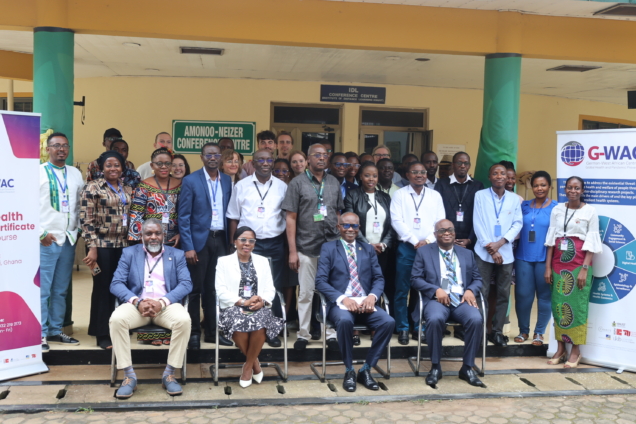Twenty-five health personnel across the sub-region and Germany are receiving training on the One Health concept from the German-West Africa Centre for Global Health and Pandemic Prevention (G-WAC) at the Kwame Nkrumah University of Science and Technology (KNUST).
The five-day workshop which is in its second year will delve into the interconnectedness of human, animal, and environmental health, stating the importance of a collaborative approach in addressing health threats in the African setting and elsewhere.
The One Health concept is an approach being used to address the existential threat of global pandemics to the health and welfare of people.
The Director of the German-West Africa Centre for Global Health and Pandemic Prevention (G-WAC), Dr. John Amuasi stated that the course will explore interventions needed to address the threats posed by these pandemics.
“This course will explore what we need to put in place by way of research and also to understand how to develop various interventions and solutions as well as how to monitor the outcome of what we are doing so that we can do them better.
"And hope to protect not only humans but animals and the entire environment from some these pathogens and ultimately the problems they cause us," he said.
He also noted the course's uniqueness and practicality.
“This is very unique because it will cut across food issues, environmental issues and pathogens. Most of the time is going to be spent practically visiting important places, for example, the Kumasi Abattoir, and the Barekese Dam because these are critical points of confluence of humans and animals and it will help us address what risk is and also put I place the right measures to address these risk and diseases,” he said.
The short course offers competency-based training, multidisciplinary learning and will enhance networking and partnership opportunities for policy-makers, global health practitioners, and researchers.
The scientific coordinator for G-WAC, German-Berlin, Verena Struckmann expects the participants to be well accustomed to the One Health approach practically.
“The participants should be well acquainted with the one health approach not only in their theoretical manner. We are going to the field and it’s the first time they are going to apply the gained knowledge in their local, national and workplace context but in the end, they should get the concept in a way they will be able to insert it in their work in a long term manner and contribute to acknowledge this concept more than it has been done before,” she said.
The course is supported by the German Academic Exchange Service (DAAD) with funding from the budget of the Federal Foreign Office.
Latest Stories
-
I want to focus more on my education – Chidimma Adetshina quits pageantry
2 hours -
Priest replaced after Sabrina Carpenter shoots music video in his church
2 hours -
Duct-taped banana artwork sells for $6.2m in NYC
3 hours -
Arrest warrants issued for Netanyahu, Gallant and Hamas commander over alleged war crimes
3 hours -
Actors Jonathan Majors and Meagan Good are engaged
3 hours -
Expired rice saga: A ‘best before date’ can be extended – Food and Agriculture Engineer
3 hours -
Why I rejected Range Rover gift from a man – Tiwa Savage
3 hours -
KNUST Engineering College honours Telecel Ghana CEO at Alumni Excellence Awards
4 hours -
Postecoglou backs Bentancur appeal after ‘mistake’
4 hours -
#Manifesto debate: NDC to enact and pass National Climate Law – Prof Klutse
4 hours -
‘Everything a manager could wish for’ – Guardiola signs new deal
4 hours -
TEWU suspends strike after NLC directive, urges swift resolution of grievances
4 hours -
Netflix debuts Grain Media’s explosive film
5 hours -
‘Expired’ rice scandal: FDA is complicit; top officials must be fired – Ablakwa
5 hours -
#TheManifestoDebate: We’ll provide potable water, expand water distribution network – NDC
5 hours

